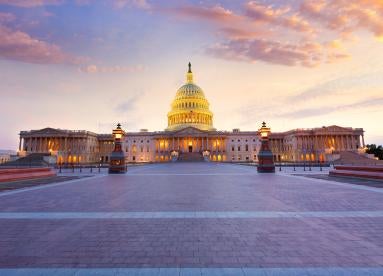Phase 3.5? Or CARES Act 2.0?
On April 9, 2020, the U.S. Senate failed to approve a measure that would have added $251 billion in funding for the Small Business Administration’s (SBA) Paycheck Protection Program established under the Coronavirus Aid, Relief, and Economic Security (CARES) Act. Senate Democrats objected to moving the measure via unanimous consent, maintaining that additional funding is needed to support states, hospitals, and rural and minority-owned small businesses. Moreover, there are still reports that Democrats would like to include vote-by-mail provisions, as well as potential hazard pay for workers in essential industries, in any subsequent federal legislative response.
COVID-19 Policy Update.
Set forth below are recent COVID-19-related policy developments.
-
Workplace Safety. The U.S. Occupational Safety and Health Administration (OSHA) has issued several guidance documents relating to the use of respirators in the workplace.
-
On April 8, 2020, OSHA updated its temporary guidance addressing fit-testing requirements for N95 respirators. While the original guidance only applied to the healthcare industry, the April 8 update extends to “all workplaces covered by OSHA where there is required use of respirators.”
-
On April 3, 2020, OSHA issued guidance allowing for extended use and reuse of N95 respirators, and in certain circumstances, allowing their use beyond their expiration dates.
-
Also on April 3, 2020, OSHA issued guidance permitting, in certain circumstances, the use of respirators that are not approved by the National Institute for Occupational Safety and Health (NIOSH) but that are certified in certain jurisdictions.
-
-
EEOC Update. On April 9, 2020, the Equal Employment Opportunity Commission updated its guidance relating to COVID-19 and equal employment opportunity laws. The guidance expands on previous guidance focused on the Americans with Disabilities Act and includes answers to frequently asked questions.
-
CARES Act Loans.
-
April 10, 2020, marks the first date that independent contractors and sole proprietors can apply for loans under the CARES Act’s SBA Paycheck Protection Program.
-
On April 9, 2020, the Federal Reserve released details of its “Main Street Lending Program,” which will be funded through CARES Act appropriations.
-
-
Department of Labor LCA FAQ. On April 9, 2020, the U.S. Department of Labor’s (DOL) Office of Foreign Labor Certification issued “Round 3” of its frequently asked questions (FAQs) regarding COVID-19. Among other matters, this round of FAQs addresses whether H-1B workers can be moved to worksites not indicated on the employer-approved Labor Condition Application (LCA). (“Round 2” and “Round 1” FAQs were issued on April 1, 2020, and March 20, 2020 respectively.)
-
SCOTUS Arguments on Hold. On April 3, 2020, the Supreme Court of the United States announced that it would postpone oral arguments scheduled for April. According to a press release, “The Court will consider rescheduling some cases from the March and April sessions before the end of the Term, if circumstances permit in light of public health and safety guidance at that time. The Court will consider a range of scheduling options and other alternatives if arguments cannot be held in the Courtroom before the end of the Term.
NLRB Delays New Representation Rule.
Last week, the Buzz discussed the National Labor Relations Board’s changes to its procedures concerning blocking charges, the voluntary recognition bar, and Section 9(a) recognition in the construction industry. On April 8, 2020, the Board announced that the effective date of those changes would be pushed back 60 days in light of the current healthcare crisis. The new effective date is July 31, 2020.
SCOTUS Opines on ADEA.
On April 6, 2020, the Supreme Court of the United States held, in Babb v. Wilkie, that federal sector plaintiffs need not establish that age was a “but for” cause of a personnel action to demonstrate a violation of the federal sector provision of the Age Discrimination in Employment Act (ADEA). That provision provides that “personnel actions” affecting federal sector workers aged 40 and older “shall be made free from any discrimination based on age.” Of course, this provision is decidedly different than the private sector provision of the ADEA, which the Supreme Court has held requires “but for” causation. If Congress ever returns to non-COVID-19 legislating, the Buzz will be watching to see if Babb v. Wilkie gives proponents of the Protecting Older Workers Against Discrimination Act a political boost.
Congress and Remote Voting.
With the current healthcare crisis discouraging large gatherings, members of Congress have been discussing alternative ways to legislate in a safe manner. To that end, this week Speaker of the U.S. House of Representatives Nancy Pelosi (D-CA), announced a new process to electronically submit bills and resolutions. Will remote voting be next? Probably not anytime soon. Indeed, a recent report from the House Rules Committee outlines some of the security and constitutional challenges to remote voting. Additionally, the House has not moved very quickly to change its voting procedures in the past. While Thomas Edison received a patent for an electronic vote recorder back in 1869, the House did not adopt electronic voting—using cards and push buttons—until over 100 years later, in 1973 (the U.S. Senate still does manual roll call votes). So, while anything can happen, it is likely that members of Congress will have to continue to do their jobs in person—while following proper social distancing protocols, of course.




 i
i


